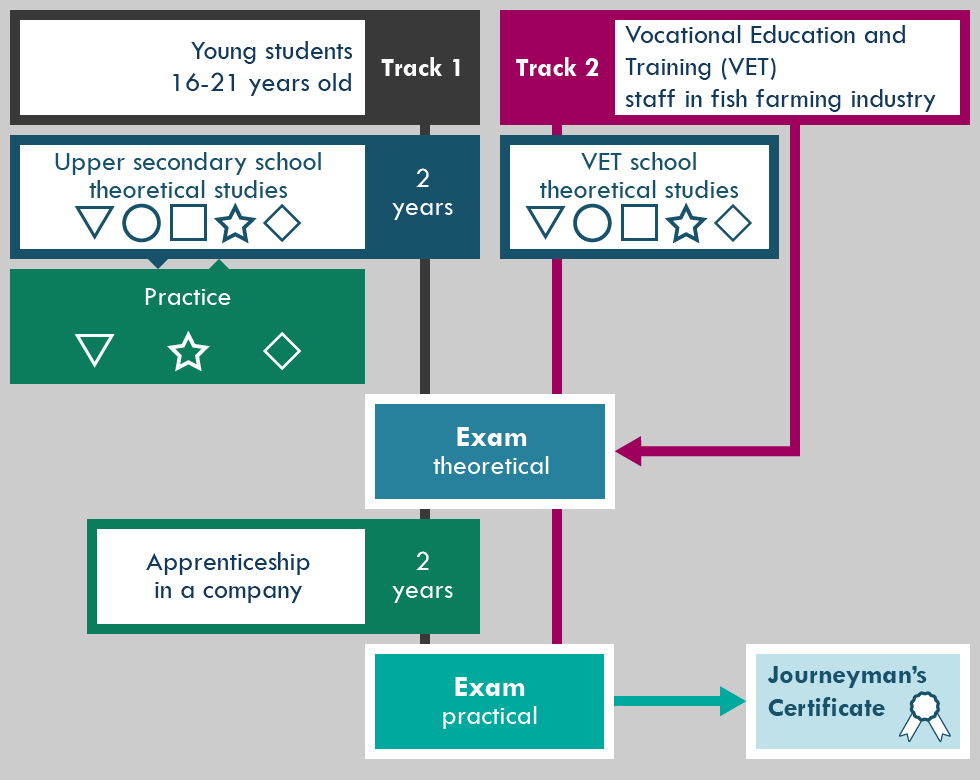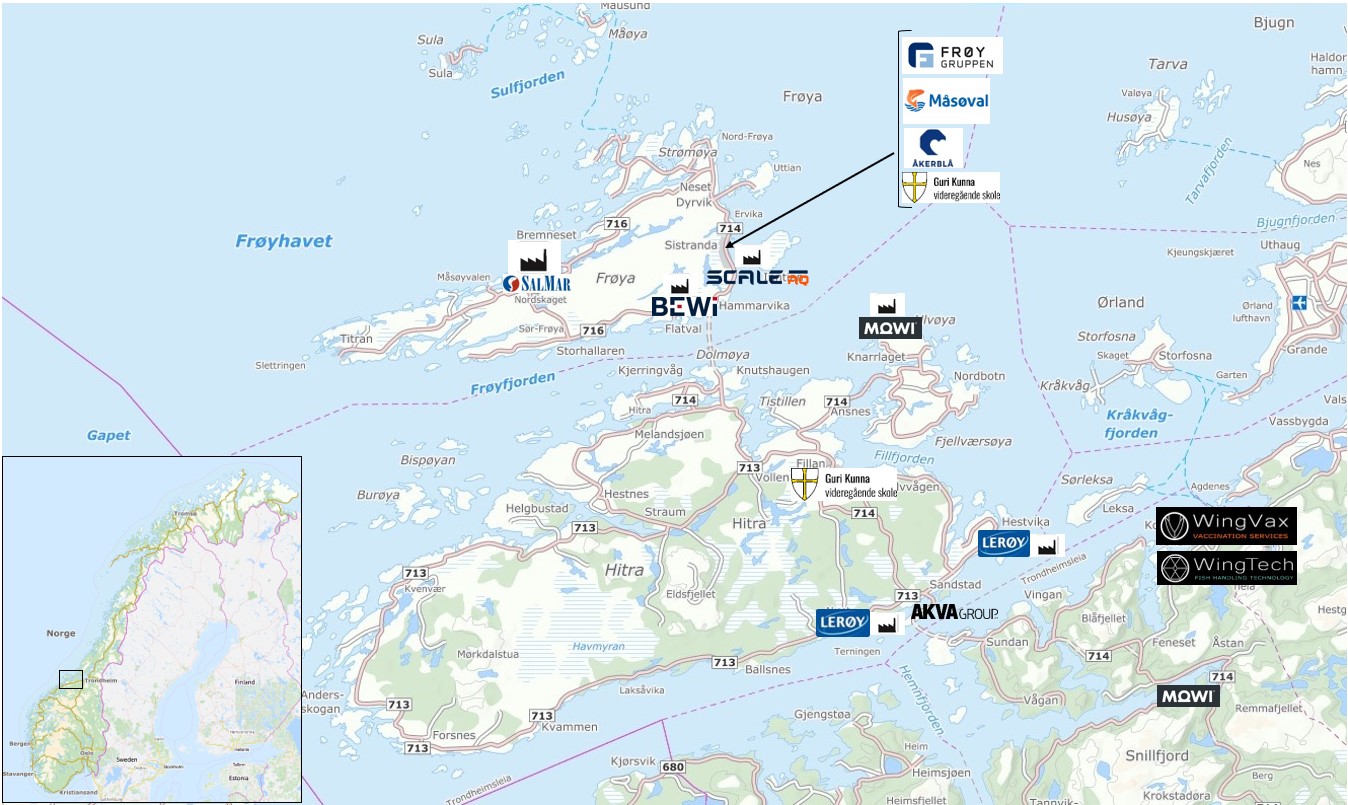

The school is owned by Trondelag County Authority and has 350 students. The Aquaculture sector of the school has 150 young students in the VET program and 50 students in the Higher VET programs.
The school is situated in both Froya and Hitra municipalities in the Mid Norway coastal region.
Guri Kunna VET School was established in 1975
Guri Kunna VET School is established at upper secondary level.
Today, approximately 350 students are trained in seven program areas:
- Technical and Industrial Production
- Electrical Trades / Automation
- Building and Construction
- Restaurant and Food Processing Trades
- Aquaculture / Fishing and Forestry
- Health and Child Care
- General Studies (preparation for university studies)
1980: Vocational education in fish farming
One of the first schools to offer Norwegian education in fish farming for young students between 16 and 20 years of age.
1990: started delivering courses for workers in the fish farming industry
The school started to deliver courses for workers in the fish farming industry, specific to individual company needs, blending e-learning with group work and seminars.
The vast majority of the participants have participated in the courses while they are in a full job.
since 2010
200 – 250 persons from the Mid-Norway region have participated in the VET courses related to company staff in the fish farming industry and are now skilled workers in the field of fish farming / aquaculture.
The courses are organized by the school’s own training centre, Guri Kunna Recourse Centre.
Location
The school is located in the middle of the most productive area for Atlantic salmon farming in the world, at the coast of Mid-Norway.

Fish farming vocational education overview (Track 1):
The students will follow 2 years of theoretical studies, with several weeks of workplace based training integrated into it.
At the end, they must pass a theoretical exam. The exam usually consists of a problem case, where the students for instance must make a plan for how to set out smolt and feed it for ca 15 months.
Theoretical studies are followed by 2 years in the apprenticeship system, consisting of practice in a company. The students get a increasing salary during the apprenticeship. At the end of these 2 years they must pass a practical exam (the exam last for 2 days).
After passing the exams, the students receive their NQ Certificate, documenting that they have skills and competence to work in:
- a smolt production factory,
- or a fish farm,
- or a processing factory
The NQ certificate brings a higher wage/salary.
Overview of VET for workers in the fish farming industry (Track 2):
These courses are organized by the school’s own training center, Guri Kunna Recourse Center.
These courses leads to qualification as a skilled fish farm worker after passing a theoretical exam, presented documentation of five years full time relevant practice work in the fish farming industry and in the end, passing a practical exam.
Training facilities
Boat for training
The school has its own boats for use in training which can be rigged for training in both program areas, fishing and aquaculture:
- Several aluminium speed boats, for fast transportation of the students to/from the fish farms;
- a catamaran fishery boat with a full integrated classroom, whereby it become easy to switch between theory and practice when they go offshore.
Aquaculture licence
The school has an educational license for production of salmon. That means: they rent it out to a aquaculture company, for the moment; Måsøval. They run the farm on commercial basis, but in such a way that the students may come and get practice whenever they want. This farm is just a few minutes away from the school. Thus, any training activity may either start at the cage or it may start in the classroom. It us up to the teachers and students to decide.
Collaboration with the region’s fish farming industry
The school has undertaken a regional role of facilitating contact between the academic community and the service and industrial sectors in the region. The school has approximately 90 employees and close ties with industry and several providers of higher education in Norway.
One of the main missions of Guri Kunna VET School is providing the region’s fish farming industry with qualified staff. Guri Kunna VET School is known for development work with education and curriculum for the fish farming industry and is considered among the best schools in the country for providing VET courses for workers in the fish farming industry.
Several of the biggest aquaculture companies in the world are based with large units in the region around Guri Kunna VET School:
- MOWI has several salmon farm locations and a salmon slaughtery based in the region.
- Lerøy Seafood Group have several salmon farm locations, a slaugthery and a filet factory based in the region.
- SalMar has their head office, several salmon farm locations and a combined slaugthery and filet factory based in the region.
- Måsøval, a medium sized Norwegian fish farming company, have their head office and several salmon farm locations based in the region.
- Also two smaller fish farming actors are based in the region with several salmon farm locations.

Several world leading actors in the aquaculture supplier industry is based in the region:
- Scale AQ is a world leading producer of cages and nets for fish farming.
- Akva Group is a world leading supplier in a wide range of fish farm equipment.
- BEWI is a leading producer of food packaging.
- Åkerblå is a world leading supplier of fish health services.
